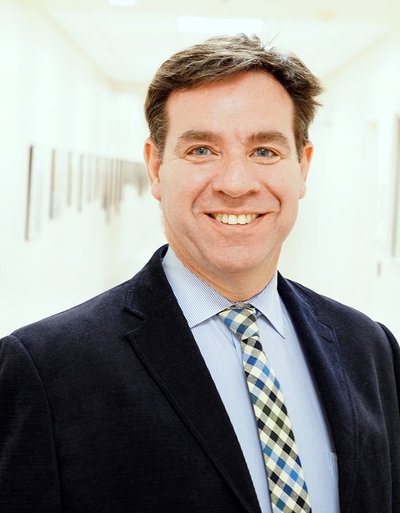
Sergio Rosenzweig, M.D., Ph.D.
Senior Investigator
Department of Laboratory Medicine
NIH Clinical Center
Research Topics
Sergio D. Rosenzweig is a pediatrician and clinical immunologist with more than 20 years of experience in the field of primary immunodeficiency. Dr. Rosenzweig is the Chief of the Immunology Service, Department of Laboratory Medicine, NIH Clinical Center, NIH. Dr. Rosenzweig’s focus of interest include the molecular aspects of PID and immunedysregulation diseases, genetic susceptibility to particular microorganisms (e.g., mycobacteria and fungal infections), the role of glycosylation in infectious disease susceptibility, and the participation of Ikaros transcription factor family in PID.
Biography
Dr. Rosenzweig earned his medical degree and his PhD from the University of Buenos Aires, Argentina in 1989 and 2006, respectively. He completed his pediatric residency in 1993 and his clinical immunology fellowship in 1996, both at the National Pediatric Hospital, in Buenos Aires, Argentina. Between 2000 and 2003 he joined the Immunopathogenesis Unit, Laboratory of Host Defenses, NIAID, NIH under Dr. Steven M. Holland as a Visiting Scientist where he studied the interferon gamma signaling pathway and the molecular basis for genetic susceptibility for mycobacterial diseases. After leaving NIH, and thanks to NIH R01 support, he continued with his interferon gamma pathway research in Buenos Aires for the following 6 years. In 2009 he returned to NIH as Chief of the Infectious Diseases Susceptibility Unit, Laboratory of Host Defenses, and Co-Director of the Primary Immunodeficiency Clinic, NIAID, NIH. In 2013 he joined the Department of Laboratory Medicine, NIH Clinical Center, under Dr. Thomas A. Fleisher, where he serves as the Immunology Service Chief.
Dr. Rosenzweig has extensible published about PID, genetic susceptibility to particular infectious diseases, and new genetic PID and immunedysregulation diseases; he is an associated editor in different journals in the field of PID, and he has been elected president for the Clinical Immunology Society.
Selected Publications
- Kuehn HS, Boisson B, Cunningham-Rundles C, Reichenbach J, Stray-Pedersen A, Gelfand EW, Maffucci P, Pierce KR, Abbott JK, Voelkerding KV, South ST, Augustine NH, Bush JS, Dolen WK, Wray BB, Itan Y, Cobat A, Sorte HS, Ganesan S, Prader S, Martins TB, Lawrence MG, Orange JS, Calvo KR, Niemela JE, Casanova JL, Fleisher TA, Hill HR, Kumánovics A, Conley ME, Rosenzweig SD. Loss of B Cells in Patients with Heterozygous Mutations in IKAROS. N Engl J Med. 2016;374(11):1032-1043.
- Sadat MA, Moir S, Chun TW, Lusso P, Kaplan G, Wolfe L, Memoli MJ, He M, Vega H, Kim LJY, Huang Y, Hussein N, Nievas E, Mitchell R, Garofalo M, Louie A, Ireland DC, Grunes C, Cimbro R, Patel V, Holzapfel G, Salahuddin D, Bristol T, Adams D, Marciano BE, Hegde M, Li Y, Calvo KR, Stoddard J, Justement JS, Jacques J, Priel DAL, Murray D, Sun P, Kuhns DB, Boerkoel CF, Chiorini JA, Di Pasquale G, Verthelyi D, Rosenzweig SD. Glycosylation, hypogammaglobulinemia, and resistance to viral infections. N Engl J Med. 2014;370(17):1615-1625.
- Boutboul D, Kuehn HS, Van de Wyngaert Z, Niemela JE, Callebaut I, Stoddard J, Lenoir C, Barlogis V, Farnarier C, Vely F, Yoshida N, Kojima S, Kanegane H, Hoshino A, Hauck F, Lhermitte L, Asnafi V, Roehrs P, Chen S, Verbsky JW, Calvo KR, Husami A, Zhang K, Roberts J, Amrol D, Sleaseman J, Hsu AP, Holland SM, Marsh R, Fischer A, Fleisher TA, Picard C, Latour S, Rosenzweig SD. Dominant-negative IKZF1 mutations cause a T, B, and myeloid cell combined immunodeficiency. J Clin Invest. 2018;128(7):3071-3087.
- IRF4 International Consortium, Fornes O, Jia A, Kuehn HS, Min Q, Pannicke U, Schleussner N, Thouenon R, Yu Z, de Los Angeles Astbury M, Biggs CM, Galicchio M, Garcia-Campos JA, Gismondi S, Gonzalez Villarreal G, Hildebrand KJ, Hönig M, Hou J, Moshous D, Pittaluga S, Qian X, Rozmus J, Schulz AS, Staines-Boone AT, Sun B, Sun J, Uwe S, Venegas-Montoya E, Wang W, Wang X, Ying W, Zhai X, Zhou Q, Akalin A, André I, Barth TFE, Baumann B, Brüstle A, Burgio G, Bustamante JC, Casanova JL, Casarotto MG, Cavazzana M, Chentout L, Cockburn IA, Costanza M, Cui C, Daumke O, Del Bel KL, Eibel H, Feng X, Franke V, Gebhardt JCM, Götz A, Grunwald S, Hoareau B, Hughes TR, Jacobsen EM, Janz M, Jolma A, Lagresle-Peyrou C, Lai N, Li Y, Lin S, Lu HY, Lugo-Reyes SO, Meng X, Möller P, Moreno-Corona N, Niemela JE, Novakovsky G, Perez-Caraballo JJ, Picard C, Poggi L, Puig-Lombardi ME, Randall KL, Reisser A, Schmitt Y, Seneviratne S, Sharma M, Stoddard J, Sundararaj S, Sutton H, Tran LQ, Wang Y, Wasserman WW, Wen Z, Winkler W, Xiong E, Yang AWH, Yu M, Zhang L, Zhang H, Zhao Q, Zhen X, Enders A, Kracker S, Martinez-Barricarte R, Mathas S, Rosenzweig SD, Schwarz K, Turvey SE, Wang JY. A multimorphic mutation in IRF4 causes human autosomal dominant combined immunodeficiency. Sci Immunol. 2023;8(79):eade7953.
- Kuehn HS, Niemela JE, Sreedhara K, Stoddard JL, Grossman J, Wysocki CA, de la Morena MT, Garofalo M, Inlora J, Snyder MP, Lewis DB, Stratakis CA, Fleisher TA, Rosenzweig SD. Novel nonsense gain-of-function NFKB2 mutations associated with a combined immunodeficiency phenotype. Blood. 2017;130(13):1553-1564.
Related Scientific Focus Areas



Microbiology and Infectious Diseases
View additional Principal Investigators in Microbiology and Infectious Diseases

This page was last updated on Friday, July 14, 2023